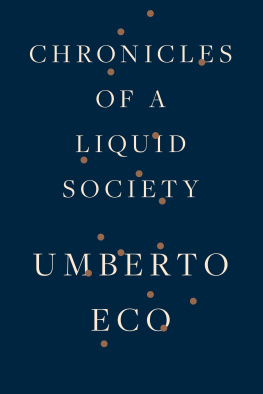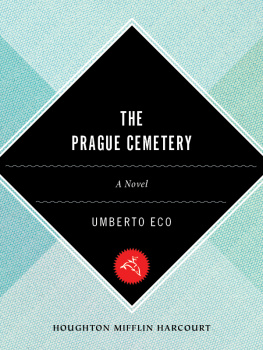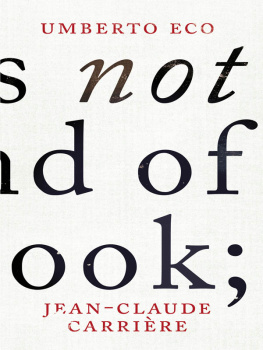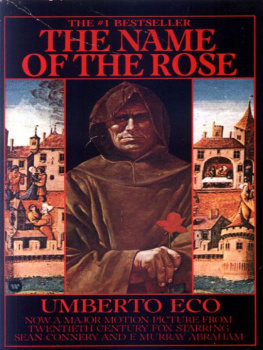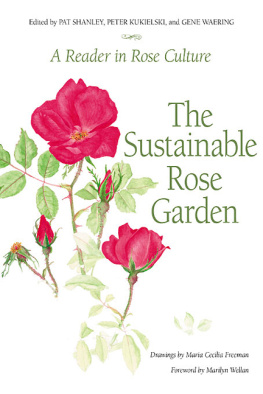Umberto Eco - The Name of the Rose (and Postscript to the Name of the Rose)
Here you can read online Umberto Eco - The Name of the Rose (and Postscript to the Name of the Rose) full text of the book (entire story) in english for free. Download pdf and epub, get meaning, cover and reviews about this ebook. year: 2014, publisher: Mariner (Houghton Mifflin Harcourt), genre: Art. Description of the work, (preface) as well as reviews are available. Best literature library LitArk.com created for fans of good reading and offers a wide selection of genres:
Romance novel
Science fiction
Adventure
Detective
Science
History
Home and family
Prose
Art
Politics
Computer
Non-fiction
Religion
Business
Children
Humor
Choose a favorite category and find really read worthwhile books. Enjoy immersion in the world of imagination, feel the emotions of the characters or learn something new for yourself, make an fascinating discovery.

- Book:The Name of the Rose (and Postscript to the Name of the Rose)
- Author:
- Publisher:Mariner (Houghton Mifflin Harcourt)
- Genre:
- Year:2014
- Rating:5 / 5
- Favourites:Add to favourites
- Your mark:
- 100
- 1
- 2
- 3
- 4
- 5
The Name of the Rose (and Postscript to the Name of the Rose): summary, description and annotation
We offer to read an annotation, description, summary or preface (depends on what the author of the book "The Name of the Rose (and Postscript to the Name of the Rose)" wrote himself). If you haven't found the necessary information about the book — write in the comments, we will try to find it.
The Name of the Rose (and Postscript to the Name of the Rose) — read online for free the complete book (whole text) full work
Below is the text of the book, divided by pages. System saving the place of the last page read, allows you to conveniently read the book "The Name of the Rose (and Postscript to the Name of the Rose)" online for free, without having to search again every time where you left off. Put a bookmark, and you can go to the page where you finished reading at any time.
Font size:
Interval:
Bookmark:

First Mariner Books edition 2014
The Name of the Rose
Copyright 1980 by Gruppo Editoriale
Fabbri-Bompiani, Snzogno, Etas S.p.A.
English translation copyright 1983 by Harcourt, Inc. and Martin Secker & Warburg Limited
Postscript to The Name of the Rose
Copyright 1983 by Umberto Eco
English translation copyright 1984 by Harcourt, Inc.
Translations for the 2014 edition by Richard Dixon
All rights reserved
For information about permission to reproduce selections from this book, write to or to Permissions, Houghton Mifflin Harcourt Publishing Company, 3 Park Avenue, 19th Floor, New York, New York 10016.
www.hmhco.com
This is a translation of Il nome della rosa and Postille a Il nome della rosa.
Library of Congress Cataloging-in-Publication Data is available.
ISBN 978-0-544-17656-0
Cover design by Christopher Moisan
Cover art Art Resource
e ISBN 978-0-547-57514-8
v4.0915

ON AUGUST 16, 1968, I WAS HANDED A BOOK WRITTEN BY A CERTAIN Abb Vallet, Le Manuscrit de Dom Adson de Melk, traduit en franais daprs ldition de Dom J. Mabillon (Aux Presses de lAbbaye de la Source, Paris, 1842). Supplemented by historical information that was actually quite scant, the book claimed to reproduce faithfully a fourteenth-century manuscript that, in its turn, had been found in the monastery of Melk by the great eighteenth-century man of learning, to whom we owe so much information about the history of the Benedictine order. The scholarly discovery (I mean mine, the third in chronological order) entertained me while I was in Prague, waiting for a dear friend. Six days later Soviet troops invaded that unhappy city. I managed, not without adventure, to reach the Austrian border at Linz, and from there I journeyed to Vienna, where I met my beloved, and together we sailed up the Danube.
In a state of intellectual excitement, I read with fascination the terrible story of Adso of Melk, and I allowed myself to be so absorbed by it that, almost in a single burst of energy, I completed a translation, using some of those large notebooks from the Papeterie Joseph Gibert in which it is so pleasant to write if you use a felt-tip pen. And as I was writing, we reached the vicinity of Melk, where, perched over a bend in the river, the handsome Stift stands to this day, after several restorations during the course of the centuries. As the reader must have guessed, in the monastery library I found no trace of Adsos manuscript.
Before we reached Salzburg, one tragic night in a little hotel on the shores of the Mondsee, my traveling-companionship was abruptly interrupted, and the person with whom I was traveling disappearedtaking Abb Vallets book, not out of spite, but because of the abrupt and untidy way in which our relationship ended. And so I was left with a number of manuscript notebooks in my hand, and a great emptiness in my heart.
A few months later, in Paris, I decided to get to the bottom of my research. Among the few pieces of information I had derived from the French book, I still had the reference to its source, exceptionally detailed and precise:
VETERA ANALECTA , Sive C OLLECTIO V ETERUM ALIQUOT OPERUM & Opusculorum omnis generis, Carminum, Epistolarum, Diplomatum, Epitaphiorum, & CUM ITINERE G ERMANICO , Adnotationibus & aliquot disquisitionibus R.P.D. Joannis Mabillon, Presbiteri ac Monachi Ord. Sancti Benedicti e Congregatione S. Mauri.N OVA E DITIO , Cui accessere M ABILONII Vita & aliquot opuscula, scilicet Dissertatio de P ANE E UCHARISTICO , A ZYMO ET F ERMENTATO , ad Eminentiss. Cardinalem B ONA . Subjungitur opusculum E LDEFONSI Hispaniensis Episcopi de eodem argumento E T E USEBII R OMANI ad T HEOPHILUM Gallum epistola, D E CULTU SANCTORUM IGNOTORUM . Parisiis, apud Levesque, ad Pontem S. Michaelis, MDCCXXI, cum privilegio Regis.
I quickly found the Vetera analecta at the Bibliothque Sainte Genevive, but to my great surprise the edition I came upon differed from the description in two details: first, the publisher, who was given here as Montalant, ad Ripam P.P. Augustinianorum (prope Pontem S. Michaelis), and also the date, which was two years later. I neednt add that these analecta did not comprehend any manuscript of Adso or Adson of Melk; on the contrary, as anyone interested can check, they are a collection of brief or medium-length texts, whereas the story transcribed by Vallet ran to several hundred pages. At the same time, I consulted illustrious medievalists such as the dear and unforgettable tienne Gilson, but it was evident that the only Vetera analecta were those I had seen at Sainte Genevive. A quick trip to the Abbaye de la Source, in the vicinity of Passy, and a conversation with my friend Dom Arne Lahnestedt further convinced me that no Abb Vallet had published books on the abbeys presses (for that matter, nonexistent). French scholars are notoriously careless about furnishing reliable bibliographical information, but this case went beyond all reasonable pessimism. I began to think I had encountered a forgery. By now the Vallet volume itself could not be recovered (or at least I didnt dare go and ask it back from the person who had taken it from me). I had only my notes left, and I was beginning to have doubts about them.
There are magic moments, involving great physical fatigue and intense motor excitement, that produce visions of people known in the past (en me retraant ces dtails, jen suis me demander sils sont rels, ou bien si je les ai rvs). As I learned later from the delightful little book of the Abb de Bucquoy, there are also visions of books as yet unwritten.
If something new had not occurred, I would still be wondering where the story of Adso of Melk originated; but then, in 1970, in Buenos Aires, as I was browsing among the shelves of a little antiquarian bookseller on Corrientes, not far from the more illustrious Patio del Tango of that great street, I came upon the Castilian version of a little work by Milo Temesvar, On the Use of Mirrors in the Game of Chess. It was an Italian translation of the original, which, now impossible to find, was in Georgian (Tbilisi, 1934); and here, to my great surprise, I read copious quotations from Adsos manuscript, though the source was neither Vallet nor Mabillon; it was Father Athanasius Kircher (but which work?). A scholarwhom I prefer not to namelater assured me that (and he quoted indexes from memory) the great Jesuit never mentioned Adso of Melk. But Temesvars pages were before my eyes, and the episodes he cited were the same as those of the Vallet manuscript (the description of the labyrinth in particular left no room for doubt).
I concluded that Adsos memoirs appropriately share the nature of the events he narrates: shrouded in many, shadowy mysteries, beginning with the identity of the author and ending with the abbeys location, about which Adso is stubbornly, scrupulously silent. Conjecture allows us to designate a vague area between Pomposa and Conques, with reasonable likelihood that the community was somewhere along the central ridge of the Apennines, between Piedmont, Liguria, and France. As for the period in which the events described take place, we are at the end of November 1327; the date of the authors writing, on the other hand, is uncertain. Inasmuch as he describes himself as a novice in 1327 and says he is close to death as he writes his memoirs, we can calculate roughly that the manuscript was written in the last or next-to-last decade of the fourteenth century.
Font size:
Interval:
Bookmark:
Similar books «The Name of the Rose (and Postscript to the Name of the Rose)»
Look at similar books to The Name of the Rose (and Postscript to the Name of the Rose). We have selected literature similar in name and meaning in the hope of providing readers with more options to find new, interesting, not yet read works.
Discussion, reviews of the book The Name of the Rose (and Postscript to the Name of the Rose) and just readers' own opinions. Leave your comments, write what you think about the work, its meaning or the main characters. Specify what exactly you liked and what you didn't like, and why you think so.


